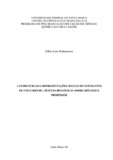| dc.creator | Krützmann, Fábio Luis | |
| dc.date.accessioned | 2019-10-24T13:57:38Z | |
| dc.date.available | 2019-10-24T13:57:38Z | |
| dc.date.issued | 2019-02-25 | |
| dc.identifier.uri | http://repositorio.ufsm.br/handle/1/18665 | |
| dc.description.abstract | This dissertation investigated the structures of the Social Representations of the students of the Course of Biological Sciences of the Federal University of Santa Maria (UFSM) on the future positions: teacher and biologist. Using the theory of Social Representations of Serge Moscovici as a theoretical and methodological contribution, we seek to analyze the representations of the students as a social construction, having as support of the identities and the undergraduate degrees in common. Using questionnaires we obtained information about the profile of the students of this course (Age, gender and work), and their representations of future professional activities through a Free Association of Words (ALP). In the years 2016, 2017 and 2018 we applied these questionnaires for freshmen and graduate students of the course, for bachelor and future teachers students. A total of 190 students participated, mostly women (67%), with an average age of 22 years and only 7% are working. Using the software OPENEVOC 0.84, we separated the words through their frequencies and Average Order of Importance. We have assembled 332 different words that help characterize the professional identity of academics from the inductive terms "teacher is" and "biologist is". When asked about biologist answers orbit around the words researcher, curious, love, and important. While the answers to teacher focused on educator, teach and essential. We conclude that the social representations of the students indicate substantial differences between freshmen and graduate students, evidencing the importance of the course in the process of socialization and construction of representations about future professions, including professional identity. | eng |
| dc.description.sponsorship | Coordenação de Aperfeiçoamento de Pessoal de Nível Superior - CAPES | por |
| dc.language | por | por |
| dc.publisher | Universidade Federal de Santa Maria | por |
| dc.rights | Attribution-NonCommercial-NoDerivatives 4.0 International | * |
| dc.rights.uri | http://creativecommons.org/licenses/by-nc-nd/4.0/ | * |
| dc.subject | Formação de professores | por |
| dc.subject | Biólogo | por |
| dc.subject | Representações sociais | por |
| dc.subject | Identidade profissional | por |
| dc.subject | Teacher training | eng |
| dc.subject | Biologist | eng |
| dc.subject | Social representations | eng |
| dc.subject | Professional identity | eng |
| dc.title | A estrutura das representações sociais de estudantes de um curso de ciências biológicas sobre biólogo e professor | por |
| dc.title.alternative | The structure of the social representations of students of a biological science course on biologist and teacher | eng |
| dc.type | Dissertação | por |
| dc.description.resumo | Esta dissertação investigou as estruturas das Representações Sociais dos estudantes do Curso de Ciências Biológicas da Universidade Federal de Santa Maria (UFSM) sobre as futuras profissões: professor e biólogo. Utilizando a teoria das Representações Sociais de Serge Moscovici como aporte teórico e metodológico, buscamos analisar as representações dos discentes como uma construção social, apoiadas nas identidades e no curso de graduação em comum. Por meio de questionários obtivemos informações sobre o perfil dos estudantes deste curso (Idade, gênero e trabalho), e suas representações das futuras atividades profissionais por meio de uma Associação Livre de Palavras. Nos anos de 2016, 2017 e 2018 aplicamos estes questionários para ingressantes e concluintes do curso, para discentes da licenciatura e bacharelado. Participaram da pesquisa um total de 190 estudantes, em sua maioria mulheres (67%), com idade média de 22 anos e 7% deles trabalhando. Utilizando o software OPENEVOC 0.84, separamos as palavras através de suas frequências e ordem média de importância. Reunimos 332 palavras diferentes que ajudam a caracterizar a identidade profissional dos acadêmicos a partir dos termos indutores “professor é” e “biólogo é”. Ao serem questionados sobre biólogo as respostas orbitam em torno das palavras pesquisador, curioso, amor e importante. Enquanto que as respostas para professor centraram-se em educador, ensinar e essencial. Concluímos que as representações sociais dos estudantes indicam diferenças substanciais entre os ingressantes e concluintes, evidenciando a importância do curso no processo de socialização e construção de representações sobre as futuras profissões, incluindo a identidade profissional. | por |
| dc.contributor.advisor1 | Tolentino Neto, Luiz Caldeira Brant de | |
| dc.contributor.advisor1Lattes | http://lattes.cnpq.br/5626168979329885 | por |
| dc.contributor.referee1 | Pagan, Alice Alexandre | |
| dc.contributor.referee1Lattes | http://lattes.cnpq.br/2208519054622204 | por |
| dc.contributor.referee2 | Dalmaso, Alice Copetti | |
| dc.contributor.referee2Lattes | http://lattes.cnpq.br/7551023626533385 | por |
| dc.creator.Lattes | http://lattes.cnpq.br/3749165648289736 | por |
| dc.publisher.country | Brasil | por |
| dc.publisher.department | Bioquímica | por |
| dc.publisher.initials | UFSM | por |
| dc.publisher.program | Programa de Pós-Graduação em Educação em Ciências: Química da Vida e Saúde | por |
| dc.subject.cnpq | CNPQ::CIENCIAS BIOLOGICAS::BIOQUIMICA | por |
| dc.publisher.unidade | Centro de Ciências Naturais e Exatas | por |



